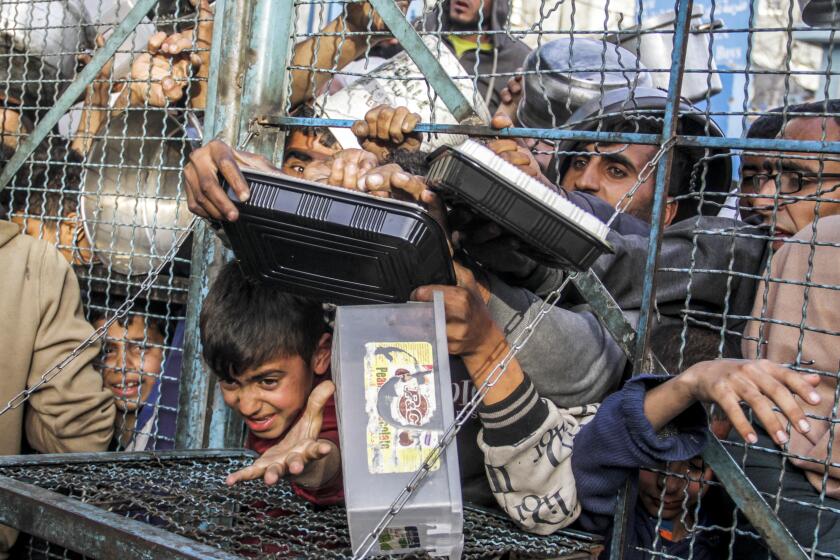Grief and anger as workers with José Andrés aid kitchen killed in Israeli airstrikes in Gaza
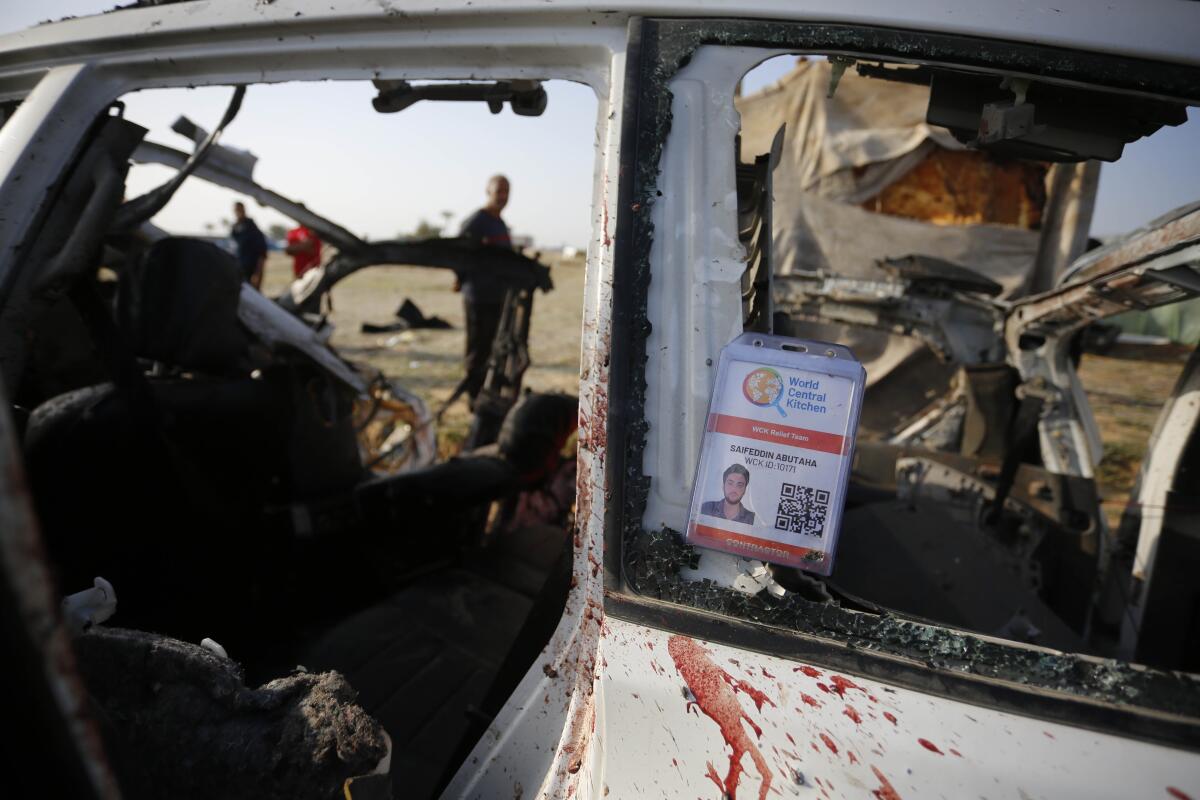
- Share via
AQABA, Jordan — It was the middle of the night at chef José Andrés’ field headquarters on the Mediterranean island of Cyprus when word came in. The early details were frightening enough, but very quickly turned utterly catastrophic.
Seven staff members from World Central Kitchen, the Andrés-founded humanitarian aid group that has been frantically working to get food aid to Palestinians in war-wrecked Gaza, had been killed late Monday in airstrikes on their convoy near the town of Deir al Balah.
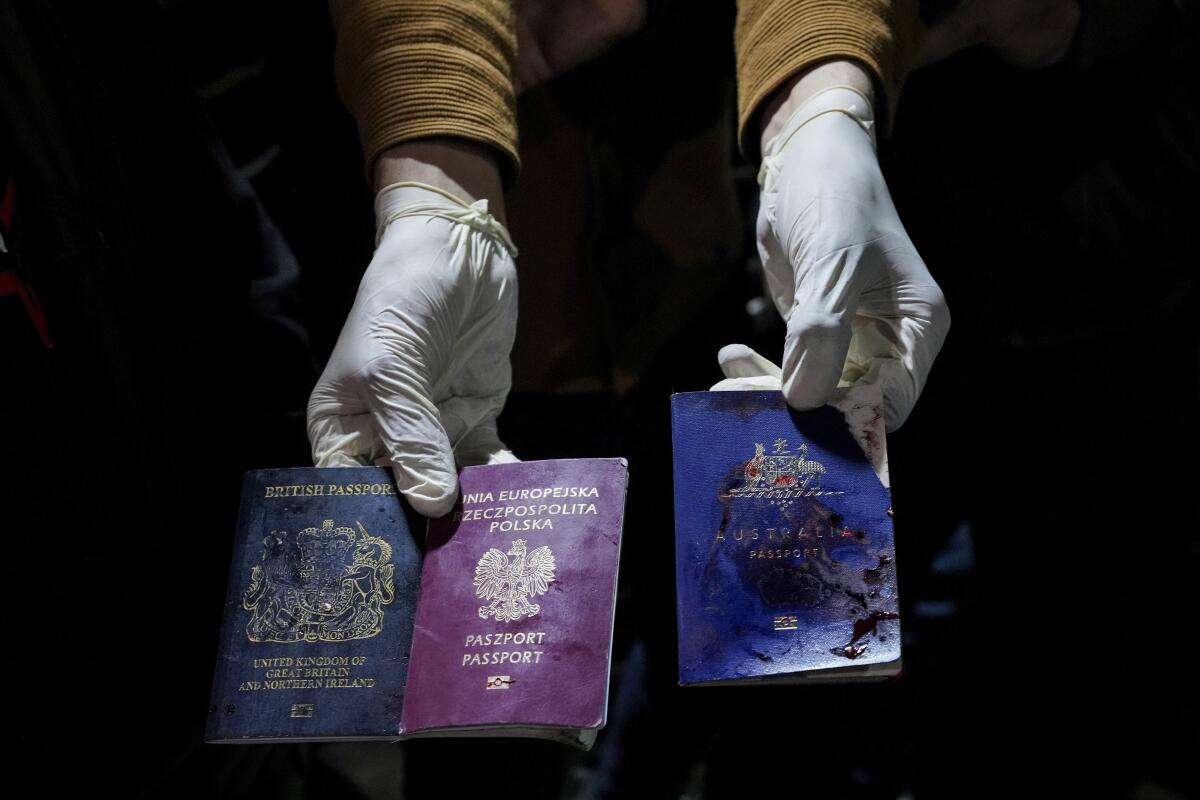
On the phone later with a Los Angeles Times reporter who had recently visited the World Central Kitchen operation in Cyprus, a back base for the Gaza relief operation, Andrés’ voice was raw with pain and grief.
“Those we lost today were more than colleagues — they were friends,” said the 54-year-old Spanish-born chef, whose voice still strongly carries the lilt of his homeland.
The group announced hours after the strikes that it was suspending its work in Gaza.
More than 15 years earlier, Andrés had begun channeling his status as a celebrity chef into tireless work in the world’s most desperate places, hammered by disasters natural and man-made.
His mission: to feed the hungry.
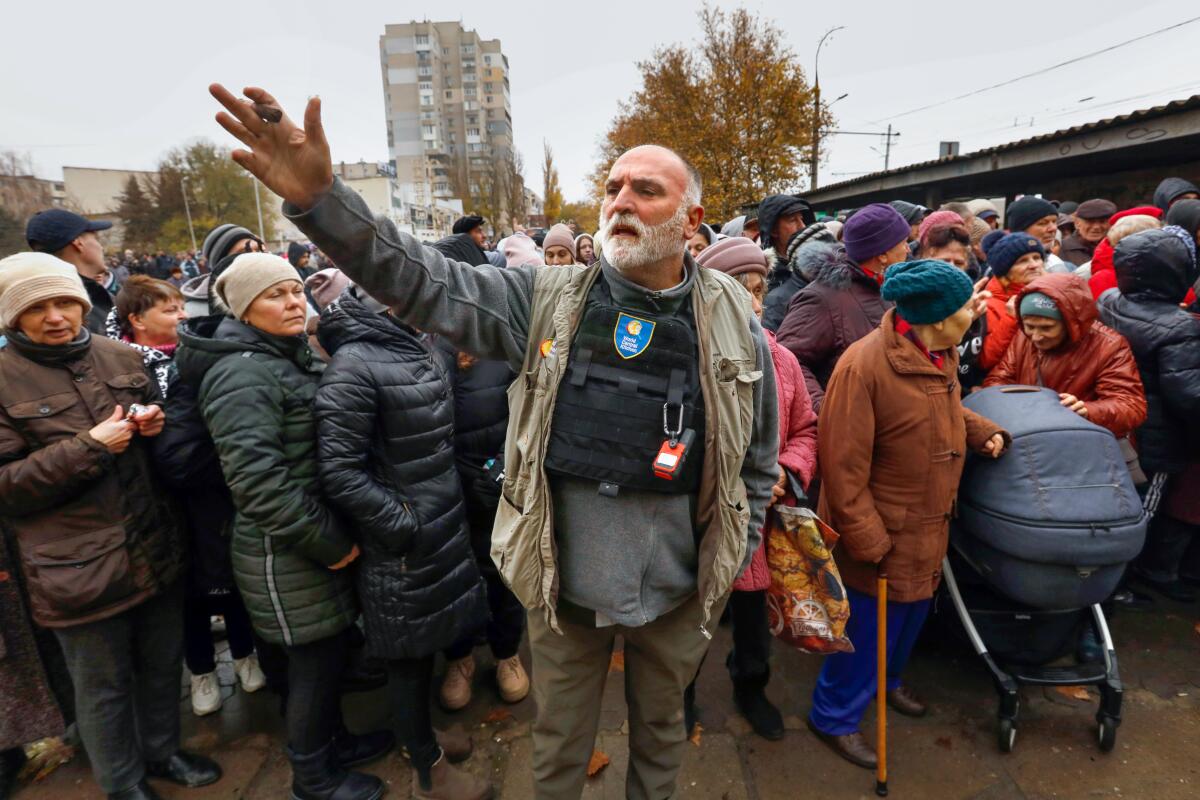
Israel acknowledged responsibility for the strikes that killed World Central Kitchen workers, saying it had been unintentional.
“There was a tragic case of our forces unintentionally hitting innocent people in the Gaza Strip,” Prime Minister Benjamin Netanyahu said Tuesday. “It happens in war — we are fully examining this.”
The prime minister said that Israel was in contact with the governments of those slain, and that “we will do everything so that this thing does not happen again.”
With warnings of ‘imminent’ famine in Gaza, there is a global push to get more aid to Palestinians amid the Israel-Hamas war. What are the roadblocks?
Gaza is facing famine, the United Nations and other aid groups have said — a consequence of the devastating war that broke out when attackers from the Palestinian militant group Hamas led a strike on communities and a music festival in southern Israel, killing some 1,200 people.
In the intervening weeks, Israel pounded the 25-mile-long Gaza Strip with airstrikes, leveling entire neighborhoods, and sent in ground troops to try to pursue Hamas in its long, elaborate network of tunnels. Nearly 33,000 Palestinians have been killed, and Israel has faced an enormous wave of worldwide revulsion over the scope and scale of the attacks.
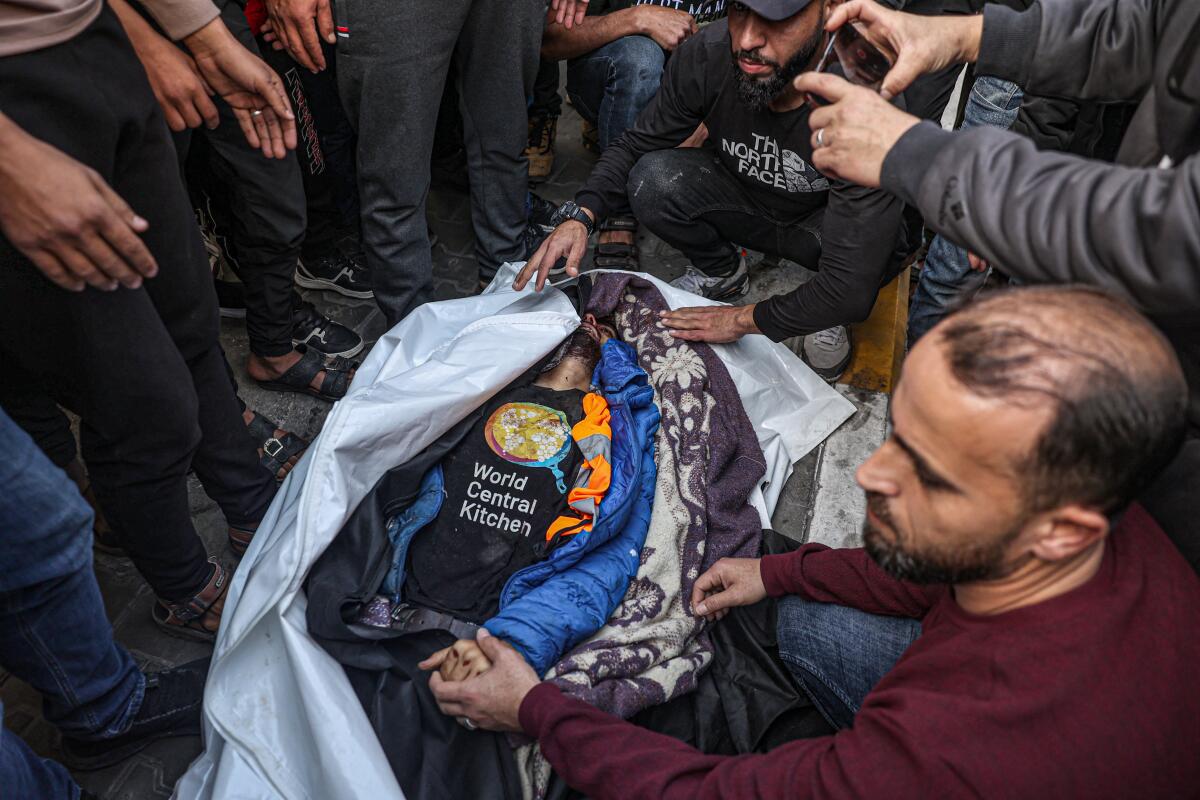
Amid the constant threat of airstrikes, aid workers in Gaza often coordinate with Israeli authorities to deliver food and other supplies. World Central Kitchen said in a statement that it had done just that prior to the delivery, informing the Israel Defense Forces of its staff members’ movements.
When the convoy — two armored cars and another vehicle — was hit, workers had just finished dropping off more than 100 tons of food at a warehouse in Deir al Balah, the group said. In the hours after the strike, gruesome videos circulated on social media, showing the vehicles’ insignia.
As the war in Gaza nears the six-month mark, the humanitarian situation has burgeoned into a full-blown crisis. Even as needs in the tiny enclave escalated, land deliveries dwindled and airdrops proved far insufficient. Andrés began to think of how to get a boat, load it with aid and dispatch it on the 200-mile voyage to Gaza.
Religious Zionists, most believing in a divine right to govern, now have outsize influence in Israel. The war in the Gaza Strip is energizing their settlement push.
In theory, the idea was simple. And the Open Arms, a venerable tugboat turned rescue vessel, and its crew from the Spanish charity Proactiva Open Arms were already docked in the serene waters of Cyprus’ port in Larnaca.
But everything else about the plan appeared impossible: Even assuming the Israelis gave permission to pass through the near-total blockade they imposed on Gaza since Oct. 7, the enclave had no deep-water port, and the fishermen’s port in Gaza City was hit in two places and and full of destroyed boats, according to satellite images Andrés had received in recent days.
Besides, even if a ship reached shore, it would still have to find a way to offload the aid and leave without Gaza residents rushing to it on the way out and risking Israeli fire.
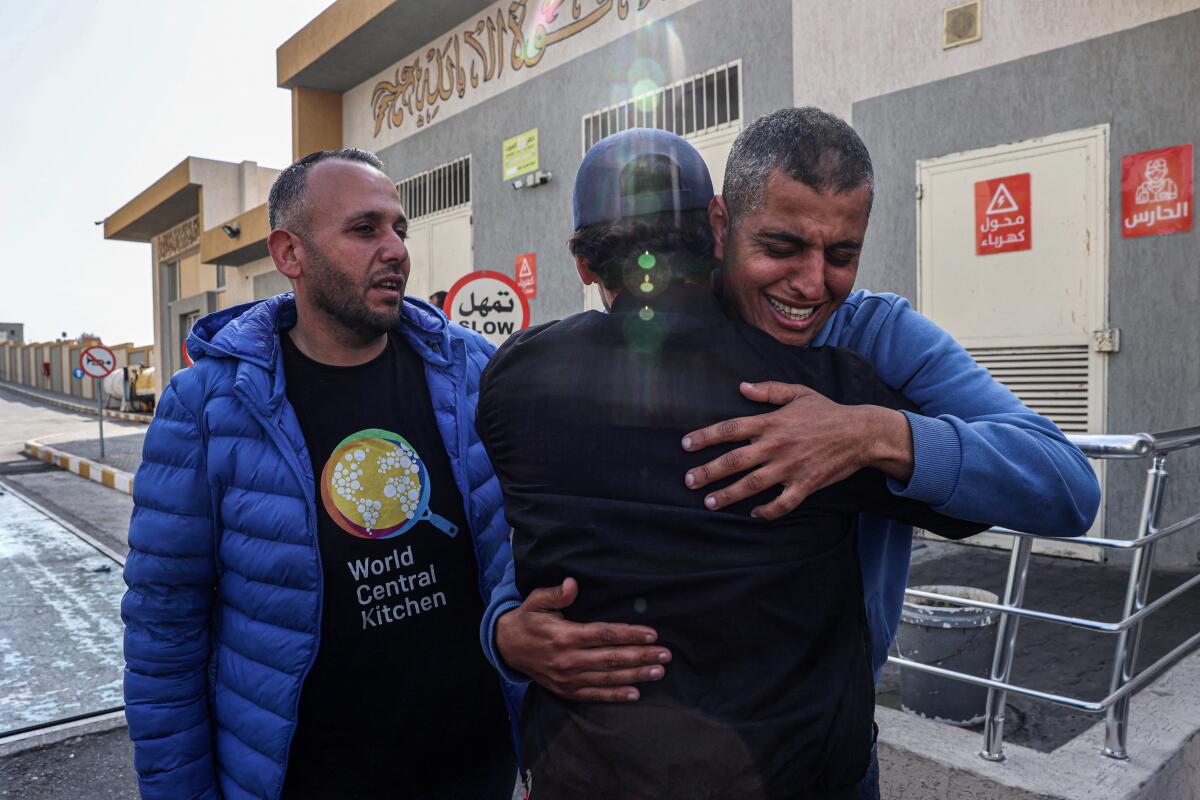
So far, everyone had told Andrés — he was in touch with Israeli officials every day and had just come from a trip to Tel Aviv to meet with the Israeli military — it was impossible. But when the Los Angeles Times visited his Cyprus operation in mid-February, he brimmed with his trademark gravel-voiced enthusiasm.
“We’re going to get criticism, but if this works, we’ll have 200 tons of food to Gaza,” he said, leaning against a panel in the bridge of the Open Arms, the sun reflecting off the sea onto his face.
World Central Kitchen was already operating 67 kitchens in Gaza, he said, including those in the north of the strip, where needs were most acute. But the food there was running out, and truck deliveries were not getting in fast enough.
“Look, at the end of the day, I can be [complaining] about why not, or I can try,” he said. “The point is to show it can be done. To shake up governments, and the other aid organizations.”
Andrés turned to Sam Bloch, World Central Kitchen’s director of emergency response, who was googling “barges” to find a platform the group could load with pallets and pull to Gaza. A 66-by-39-foot barge could carry 250 pallets, but it would triple the voyage’s duration to 60 hours, assuming fair weather. Then came the hard part, Bloch said.
“What I’m worried is that no navy wants to send people onshore. So we can take over the last mile. ... We’re neutral. We’ll do it.”
World Central Kitchen has been active in the region since the start of the conflict and says it has provided more than 43 million meals to Palestinians in Gaza, operating from two main kitchens: in the southern city of Rafah, and Deir al Balah, in central Gaza.
In addition, it supports dozens of community kitchens that dish up more than 170,000 meals daily. The work accelerated during Ramadan, the holy month when Muslims traditionally conduct a dawn-to-dusk fast broken by what in normal times would be a sumptuous repast.
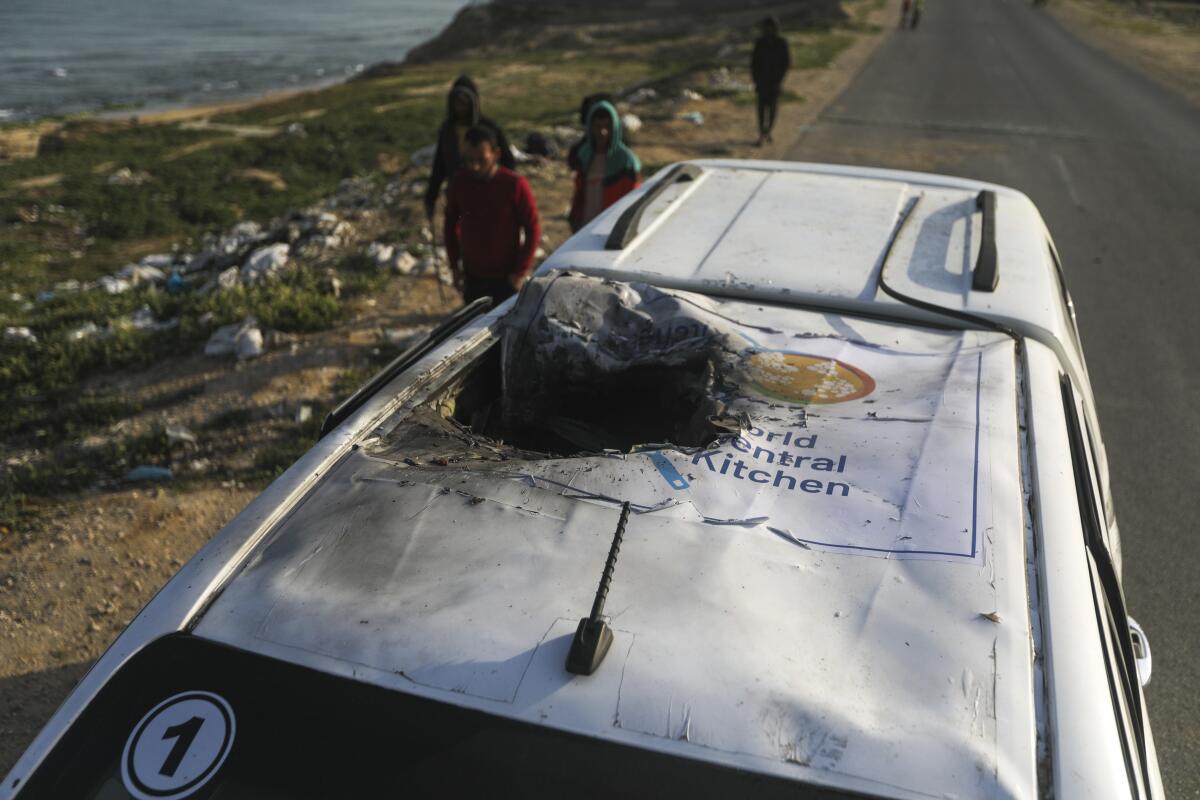
The airstrikes drew swift condemnation from international aid groups and pointed demands for more information from governments whose nationals were killed.
The dead included one Palestinian from Gaza. The rest included a dual national of the United States and Canada and others from Britain, Australia and Poland.
At a White House briefing, spokesman John F. Kirby said the Biden administration was “outraged” by the deaths, and called the incident “emblematic of a larger problem, and evidence of why distribution of aid in Gaza has been so challenging.”
Kirby noted, however, that there was no evidence the strike was deliberate, and said Israeli officials had “noted publicly that they’re responsible.”
Britain’s foreign secretary, David Cameron, called the deaths “completely unacceptable.” Canada said it expects “full accountability.”
Before the deadly episode, Israel had already been facing wide-ranging criticism over the Gaza war, including accusations of genocide aired before the International Criminal Court, and a U.N. Security Council resolution calling for a cease-fire.
The airstrike deaths came as Israelis have been taking to the streets in huge numbers in Tel Aviv and Jerusalem to demonstrate against Netanyahu, angry that the prime minister has not managed to free more than 100 Israelis still believed held in Gaza after being seized by Hamas-led militants on Oct. 7.
Many feared that the aid workers’ deaths would bring more castigation of Israel from the outside world.
“It will make a lot of repercussions, I’m sure,” said demonstrator Mike Agur, 77, of Tel Aviv. “A lot of countries will get upset.”
Over dinner during the Los Angeles Times’ visit to Cyprus, Andrés made an eerily prescient remark about coordinating with the Israelis and the extreme peril of aid deliveries in a zone of ferocious battle.
“I don’t want to be hit,” he said. “And I don’t want to get the stuff destroyed.”
But he was passionately animated in describing the Palestinians who worked in the group’s neighborhood kitchens, saying they embodied the organization’s ethos in the hardest of times.
“All you have in a disaster zone is hands. People,” he said. “We thrive in these situations, and we put everyone to work.”
Bulos reported from Aqaba and King from Washington. Times photojournalist Marcus Yam contributed to this report from Tel Aviv.
More to Read
Sign up for Essential California
The most important California stories and recommendations in your inbox every morning.
You may occasionally receive promotional content from the Los Angeles Times.
